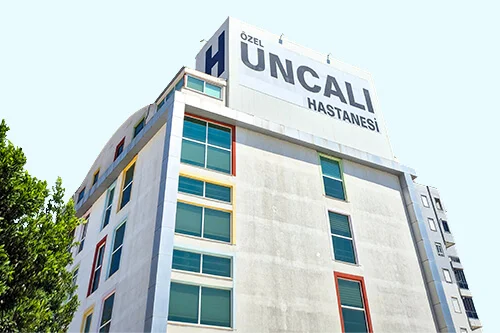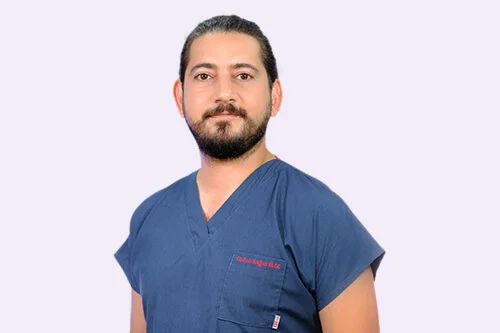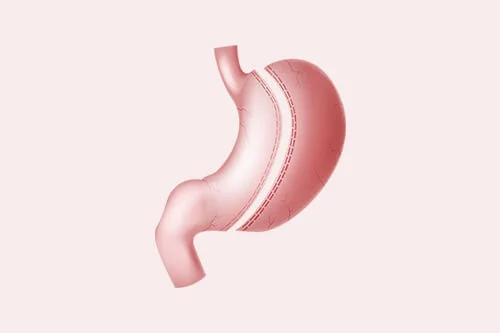Gastric Sleeve Surgery in Turkey
Skip the waiting lists and receive world-class care in Antalya. Our all-inclusive packages cover everything from VIP transfers to hotel accommodation.
Highest Safety Standards
 Fully Equipped Hospital
Fully Equipped Hospital
Your surgery will be performed in a fully equipped hospital accredited by the Turkish Ministry of Health.
 Specialised Surgeon
Specialised Surgeon
Your procedure will be carried out by a highly skilled and experienced bariatric surgeon who is specialised in weight loss surgery.
 Safe Surgery
Safe Surgery
For your safety, a leakage test is performed both during and after surgery. In addition, the staple line is reinforced with double stitching.
The whole experiance was really good. Transfers, hospital, surgery, nurses, hotel everything was done for me and the whole process was seamless.— Lynne
All-Inclusive Gastric Sleeve Package in Turkey
We want your treatment and travel experience in Turkey to be as comfortable, safe and stress-free as possible. For this reason, we offer all-inclusive packages that cover every service and cost you may encounter before and after surgery. This comprehensive approach allows you to focus solely on your procedure and recovery.
At the same time, we plan every detail of your treatment journey—from hospital coordination to transfers and accommodation. Our goal is to ensure you feel supported at every stage, with a smooth and well-organised experience from start to finish.
- Hospital and hotel accommodation
- VIP transfers (airport, hospital and hotel)
- Preoperative and postoperative tests
- Postoperative medications
- Multivitamin and protein supplements
- Nutritional support
Reasons to Choose Turkey Bariatrics
Your surgery will be performed by a highly experienced bariatric surgeon with extensive expertise in weight loss surgery.
Your surgery will be performed in a fully equipped hospital accredited by the Turkish Ministry of Health.
Before surgery, you will undergo a comprehensive evaluation by specialists in cardiology, radiology, internal medicine and anaesthesiology.
Your companion can stay with you free of charge during your hospital and hotel stay. This includes three meals per day at the hospital and breakfast at the hotel.
All medical expenses, medications, supplements, hotel accommodation and VIP transfers are included in the price. There are no hidden fees.
You will receive 12 months of nutritional support via WhatsApp from our bariatric dietitian.
Safe & Affordable Weight Loss Surgery in Turkey
At Turkey Bariatrics, we have provided weight loss surgery services for more than 15 years, helping thousands of patients achieve their weight loss goals. Our experience and dedication ensure that every patient receives exceptional care, from consultation to full recovery.
If you are considering a gastric sleeve surgery in Turkey, you can benefit from our extensive expertise and patient-centred approach. We are here to guide you through every stage of your weight loss journey with clear information, professional care and continuous support.
About us
Gastric Sleeve in Turkey
Gastric sleeve surgery is one of the most commonly performed procedures in weight loss surgery worldwide. During the operation, approximately 80% of the stomach is removed, leaving a small, banana-shaped stomach. This allows you to eat less, feel full more quickly and lose weight more effectively.
If your Body Mass Index (BMI) is 30 or above, you may be a suitable candidate for a gastric sleeve in Turkey. Contact us for a personal and no-obligation consultation, and we will be pleased to offer detailed guidance tailored to your needs.
Find Out More
Gastric Bypass in Turkey
Gastric bypass surgery, also known as the Roux-en-Y gastric bypass, is a highly effective weight loss surgery—especially for patients with morbid obesity or type 2 diabetes. During the procedure, a small pouch is created from the stomach and connected directly to the small intestine.
As the stomach volume is reduced, you naturally eat less food. At the same time, your digestive system absorbs fewer calories, making the gastric bypass one of the most powerful and effective treatment options for long-term weight loss.
Find Out More
Requirements for Gastric Sleeve in Turkey
If you meet the following criteria, you may be a suitable candidate for a gastric sleeve in Turkey. Contact us for more detailed information.
- Your Body Mass Index is 30 or above
- You have tried to lose weight with diet and exercise but were unsuccessful
- You are ready to make permanent lifestyle changes
If you do not know your current BMI, you can use our BMI calculator to find out quickly and accurately.
Calculate Your BMI
Weight Loss Surgery Turkey Before and After Photos










FAQs About Gastric Sleeve Surgery in Turkey
How much does gastric sleeve surgery cost in Turkey?
The gastric sleeve surgery cost in Turkey varies depending on factors such as the surgeon’s experience, the standards and location of the hospital, the quality of medical supplies and individual patient needs. Prices typically range between £2,500 and £3,500, offering a cost-effective alternative to many other countries.
How safe is gastric sleeve surgery in Turkey?
When performed by an experienced surgeon in a fully equipped hospital, gastric sleeve surgery is considered a safe and reliable procedure. At Turkey Bariatrics, your operation is carried out by a surgeon with an SRC Master certificate in a JCI-accredited private hospital, ensuring the highest standards of safety and quality.
How many days should I stay in Turkey for gastric sleeve surgery?
Patients generally stay in Turkey for at least 5 days. Depending on your health condition, the first 3–4 days are spent in the hospital for monitoring and recovery. After an additional 1–2 nights in a hotel, you can safely return to your home country.
What is the age limit for gastric sleeve surgery in Turkey?
Gastric sleeve surgery is suitable for patients aged 18 to 65 with a BMI of 30 or more. Those under 18 may undergo surgery with parental consent, while individuals over 65 are assessed on a case-by-case basis, taking into account overall health, blood pressure, diabetes and other medical conditions.
How much do I need to weigh for gastric sleeve surgery in Turkey?
Body weight itself is not the determining factor; what matters is your Body Mass Index (BMI). For gastric sleeve surgery in Turkey, your BMI must be at least 30. BMI is calculated using weight (kg) divided by height in metres squared (m²). For example, someone who is 1.65 metres tall should weigh 82 kg or more. You can calculate your BMI using our online tool.
How many days before gastric sleeve surgery should I come to Turkey?
We recommend arriving one day before surgery to ensure all pre-operative preparations can be completed comfortably. However, depending on your flight schedule, it is also possible to arrive on the morning of the operation.
Can I bring a companion with me?
Yes, you may bring a companion, and many patients find it helpful during their stay. Your companion can stay with you free of charge, both in the hospital—where an additional bed is provided—and in the hotel during the rest of your stay in Turkey.
Does health insurance cover the cost of gastric sleeve surgery in Turkey?
In most cases, health insurance companies do not cover the cost of gastric sleeve surgery abroad. Coverage is approved only in exceptional circumstances. We recommend contacting your insurer directly to check whether reimbursement is possible for treatment in Turkey.
Which airlines fly to Antalya?
There are direct flights from the UK to Antalya (AYT) with easyJet and Jet2.com. Additional flight options are available with Turkish Airlines, SunExpress, Wizz Air, Lufthansa and Corendon. A non-stop flight from the UK to Antalya takes approximately 4.5 hours.
Weight Loss Surgery in Turkey: A Complete Guide
Safe and Effective Weight Loss Surgery in Turkey
If you are struggling to reach your weight loss goals and traditional methods such as dieting, exercise, or medication have not been successful, weight loss surgery in Turkey may be the right solution. Many patients also turn to surgery when excess weight leads to health problems like high blood pressure, diabetes or heart disease. Weight loss surgery can offer a long-term improvement in both health and quality of life.
Weight loss surgery works by either reducing the size of the stomach or modifying the digestive system to limit food intake and calorie absorption. Several procedures are available, including gastric sleeve, gastric bypass, gastric band, and gastric balloon, each offering different advantages depending on your goals and medical needs. Gastric sleeve and gastric bypass are generally the most effective options, helping patients achieve significant and lasting results.
Weight Loss Surgery in Turkey with an All-Inclusive Package
The cost of weight loss surgery in Turkey depends on several factors, such as the hospital’s accreditation, service quality, the surgeon’s experience, equipment standards, medication, accommodation and transfers. These variables influence overall pricing and help ensure high-quality care throughout your treatment.
On average, a gastric sleeve in Turkey costs between £2,500 and £3,500, while a gastric bypass ranges from £3,000 to £4,500. Most patients stay in the hospital for 3 to 4 days, depending on their procedure and medical condition. At Turkey Bariatrics, we provide fair, transparent and fixed prices with absolutely no hidden fees, ensuring you know your full cost before treatment begins.
To receive more information about our treatments and packages, simply fill out the contact form on our website. We will get back to you as soon as possible.
Requirements for Weight Loss Surgery in Turkey
Although weight loss surgery can be a highly effective way to achieve a healthier life, it is not suitable for everyone. If you are considering weight loss surgery in Turkey, you must meet a number of important criteria to ensure a safe and successful treatment process.
First, you must have a BMI of 30 or more. (Use our BMI calculator to determine this accurately.) You should also have previously attempted conventional weight loss methods but struggled to achieve or maintain significant results. In addition, you must not suffer from severe uncontrolled heart or lung disease, and you must not have an active alcohol or drug addiction.
Patients must be willing to commit to long-term lifestyle changes, including new eating habits and regular physical activity. If you are ready to start your journey towards a healthier future, contact us today. We would be happy to guide you through every step.
Life After Weight Loss Surgery in Turkey
Following weight loss surgery in Turkey, most patients remain in the hospital for 3 to 4 days. During the initial recovery period, symptoms such as pain, fatigue, nausea, vomiting, bloating, diarrhoea and dizziness are common but easily manageable with medication. Walking frequently is strongly encouraged, as it helps reduce bloating and minimise postoperative complications.
Your diet will progress through three stages: liquid, pureed and solid foods. Although timelines can vary, most patients begin eating solid food after around three weeks. Before discharge, you will receive personalised dietary guidance from our experienced dietitian, ensuring you feel confident about your nutritional needs at home.
Recovery takes time and varies from person to person. It is normal to feel weak during the first few weeks, but this gradually improves. During the first six weeks, patients are encouraged to engage in low-impact activities such as walking or cycling. After this period, physical activity can be gradually increased to support long-term success.
Weight Loss Surgery Reviews in Turkey
Hearing real experiences from patients who have undergone weight loss surgery in Turkey can be incredibly valuable when deciding on your treatment. At Turkey Bariatrics, patient satisfaction and exceptional outcomes are our highest priority. Our verified reviews on Trustpilot provide honest feedback on consultations, treatments and overall results.
Our former patients frequently highlight improvements in energy, mobility and confidence, as well as life-changing health benefits. Their testimonials offer reassurance and help new patients understand what to expect on their journey.
Advantages of Weight Loss Surgery in Turkey
One of the most significant benefits of weight loss surgery in Turkey is the rapid and sustained weight loss patients typically experience. Many reach their ideal weight within 12 months, enabling them to enjoy a healthier and more active lifestyle. The surgery also often resolves or greatly improves conditions such as high blood pressure, type 2 diabetes, sleep apnoea and high cholesterol.
Beyond physical health, patients commonly report improvements in self-esteem, social confidence and overall mental wellbeing. Increased mobility and energy often lead to a more active lifestyle, helping to maintain long-term results. However, it is essential to remember that weight loss surgery is a tool, and long-term success depends on consistent dietary, exercise and lifestyle habits.
The Best Clinic for Weight Loss Surgery in Turkey
Turkey is widely recognised as one of the world’s most popular destinations for medical tourism. More than one million international patients visit each year for treatments such as cosmetic surgery, weight loss surgery, hair transplants and dental care. Competitive prices and high medical standards make Turkey an excellent choice for many patients seeking safe and effective care.
When choosing a clinic for weight loss surgery in Turkey, selecting a Joint Commission International (JCI) accredited hospital is essential. JCI accreditation ensures compliance with the highest global standards of safety and quality. At Turkey Bariatrics, all procedures are performed at Medstar Antalya Hospital, a JCI-accredited facility where patient safety and comfort are our top priorities.
Risks and Complications of Weight Loss Surgery
As with any major surgery, weight loss surgery carries certain risks and potential complications. Short-term risks include bleeding, infection, blood clots and reactions to anaesthesia. These risks vary depending on the patient’s age, weight, pre-existing conditions and overall health.
Long-term complications may include gallstones, kidney stones, hernias, nutrient deficiencies and dumping syndrome, especially after gastric bypass surgery. It is important to understand that the mortality rate is extremely low—less than 0.05%—similar to routine surgeries such as appendix or gallbladder removal. Fatalities are rare and usually linked to severe underlying health issues.
Non-Surgical Weight Loss in Turkey: The Allurion Gastric Balloon
If you are looking for a non-surgical weight loss solution in Turkey due to concerns about anaesthesia, surgical risks or scarring, the Allurion Gastric Balloon may be an ideal alternative. Like other gastric balloons, it reduces appetite and helps control portion sizes, but it offers unique advantages.
Unlike traditional balloons, the Allurion method requires neither endoscopy nor anaesthesia. The balloon is placed by swallowing a capsule with water during an outpatient appointment. After around four months, it naturally deflates and is excreted from the body without the need for removal.
To be eligible for the Allurion Gastric Balloon in Turkey, patients must be at least 16 years old, have a BMI of 27 or more, and have no history of stomach or oesophageal surgery. Most patients lose about 7 kg in the first month and 10–15% of their total body weight within four months.